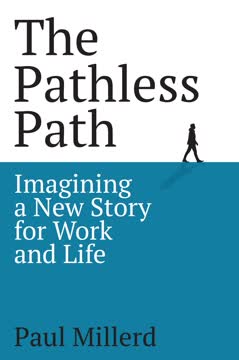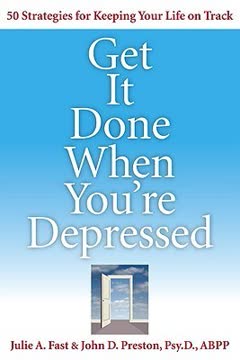Key Takeaways
1. Act Despite Feelings & Build Momentum
Waiting until you feel like doing something is the single biggest mistake you can make when you’re depressed and need to get things done.
Motivation follows action. Depression often robs you of the desire to act, making even simple tasks feel impossible. However, the key is to understand that motivation often follows action, rather than preceding it. By simply starting a task, no matter how small or unappealing, you can generate the momentum needed to continue and even find enjoyment in the process. This breaks the cycle of waiting for inspiration that never comes.
Just start, then keep going. On days when you feel overwhelmed or catatonic, the smallest initial step can be a powerful catalyst. Don't overthink; just sit down, put on your shoes, or open the document. Once you initiate the action, use an inner "drill sergeant" voice to push through the inertia. This forceful self-talk helps override the passive, negative urges of depression, ensuring you don't lose entire days to inaction.
Break it down. Large projects can feel insurmountable when depressed. Instead of focusing on the entire task, break it into tiny, manageable steps. Focus on completing just one step at a time, and don't move to the next until the current one is finished. This micro-management of tasks, combined with setting strict time limits for each step, creates a sense of accomplishment and prevents the feeling of being overwhelmed.
2. Master Your Inner Dialogue
Depression is a very selfish illness that makes you focus internally all the time.
Challenge negative self-talk. Depression fills your mind with a constant, critical commentary, telling you that you're worthless, incapable, or that your efforts are futile. This "brain chatter" is often repetitive, fast, and overwhelmingly negative, making it difficult to focus or believe in yourself. It's crucial to recognize these thoughts as lies generated by the illness, not truths about your abilities or worth.
Talk back forcefully. You wouldn't let a real person bully you, so don't let depression do it. Confront these negative thoughts directly and forcefully. Say "NO!" or "STOP!" out loud, or use a personal mantra like "This is depression. It's not the real me." This act of talking back reclaims your power and helps you distinguish between your true self and the distorted voice of the illness.
Delay judgment and praise yourself. Depression is a harsh judge, often making you criticize your work before it's even finished, leading to quitting or not starting at all. Instead, commit to completing the task first, then objectively evaluate it. Once a task is done, no matter how small, actively praise yourself. This self-praise, even if it feels awkward initially, reinforces positive behavior and counteracts the ingrained negativity, building a sense of accomplishment.
3. Optimize Your Environment & Schedule
When you’re depressed, it always helps to know in advance what your day will look like.
Structure creates calm. A lack of structure can lead to chaos and increased depression, making it harder to get things done. Just as children thrive on routine, your depressed brain benefits immensely from a predictable schedule. Plan your day in advance, including meal times, work blocks, and even leisure activities. This foresight reduces decision fatigue and provides a roadmap for navigating difficult days.
Minimize distractions. A depressed brain is easily distracted, often leading to unproductive "negotiations" with yourself (e.g., "just one more phone call"). Identify your main distractions—be it email, social media, or even household chores—and proactively eliminate them from your workspace. Create a dedicated, realistic work environment that supports focus, even if it means working in a quiet library or turning off your phone.
Prepare in advance. Mornings can be particularly challenging when depressed, often marked by rushing, forgetfulness, and increased anxiety. Combat this by preparing as much as possible the night before. This includes:
- Laying out clothes
- Packing lunch
- Organizing work materials
- Ensuring your car has gas
- Reviewing your schedule and appointments
This simple habit can significantly reduce morning stress and set a more positive tone for the day.
4. Prioritize Physical Health
Exercise is one of the best ways to deal with depression, yet you can feel so completely against doing the exercise that it often feels better to just sit around and stay depressed.
Move your body, shift your mind. Depression often manifests physically, causing lethargy, restlessness, and general discomfort. Thinking like an athlete means separating your physical actions from your mental state. Even when your mind screams "impossible," force your body to move. Just 20 minutes of brisk walking can release endorphins and significantly improve your mood and energy levels.
Anticipate physical discomfort. Recognize that physical discomfort—like restless legs, headaches, or general antsy feelings—is a common symptom of depression, not a sign of a deeper physical ailment. Accept that you might feel uncomfortable while working, but don't let it stop you. Instead, use strategies like stretching, deep breathing, or short breaks to manage the discomfort without abandoning your tasks.
Regulate sleep and manage stimulants. Sleep is fundamental to mood regulation and productivity. Depression can cause you to sleep too much or too little, but either way, it often disrupts restorative deep sleep. Establish a consistent sleep schedule, even on weekends, and create a calming bedtime routine. Be mindful of caffeine and sugar, which offer fleeting energy boosts but can exacerbate anxiety, disrupt sleep, and lead to mood crashes, ultimately hindering your ability to get things done.
5. Leverage Social Support & Set Boundaries
Depression is a very selfish illness that makes you focus internally all the time.
Combat isolation with connection. Depression often pushes you towards isolation, leading to profound loneliness and a belief that you're better off alone. However, human contact is a powerful antidote. Force yourself to engage with others, even if it's just a brief interaction or working alongside a friend on separate tasks. Their energy and presence can significantly boost your mood and productivity.
Work with a friend. When motivation is low, leverage the energy and accountability of others. Ask a trusted friend or colleague to work with you on a project, even if it's just sitting together in a coffee shop. They can help you stay focused, set time limits, and provide encouragement. This collaborative approach can make daunting tasks feel more manageable and less lonely.
Learn to say no and delegate. Depression can make you feel guilty about saying no, leading to overcommitment and increased stress. Practice setting boundaries by politely declining requests that don't align with your capacity. Additionally, don't hesitate to ask others to handle "the little stuff" that feels overwhelming, like chores or errands. Swallowing your pride and delegating tasks frees up mental and physical energy for more important obligations.
6. Embrace Realistic Expectations & Purpose
Your best is going to change from moment to moment; it will be different when you’re healthy as opposed to sick.
Redefine "your best." When depressed, your "best" will not be the same as your "well" best. Stop comparing your current productivity to past achievements or others' capabilities. Accept that your capacity is limited by the illness and focus on doing the absolute best you can in the moment. This realistic self-assessment reduces self-judgment and allows you to feel proud of any accomplishment, no matter how small.
Accept losses and move forward. Depression can lead to significant losses—missed opportunities, strained relationships, or unfulfilled dreams. Acknowledge and mourn these losses without dwelling in anger or bitterness. While some losses are permanent, accepting them allows you to shift your focus to what you can control and build a new, more positive future. This isn't giving up; it's a pragmatic step towards healing and renewed productivity.
Find purpose in the everyday. Depression strips away the sense of purpose, making everything feel meaningless. Actively seek and identify purpose in your current work, family obligations, and daily activities. Even if your job isn't your dream career, recognize its value in providing for yourself or loved ones. If your creative drive is stifled, force yourself to engage in artistic activities; the act of creation itself can be therapeutic and surprising.
7. Seek Professional Treatment
Study after study shows that adding therapy to your depression treatment plan significantly decreases your depression symptoms.
Consider medication. Depression is a physiological illness, and for many, medication is a crucial component of effective treatment. Antidepressants can help rebalance brain chemicals, improving concentration, energy, and mood. Don't view medication as a weakness or a "crutch"; it's a tool to help your brain function optimally, allowing you to engage more effectively with other strategies and live a more productive life.
Engage with therapy. A qualified therapist offers an objective perspective and specific tools to navigate depression. Therapy can help you:
- Identify and challenge distorted thoughts (cognitive therapy)
- Develop constructive behaviors (behavioral therapy)
- Improve problematic relationships (interpersonal therapy)
- Process difficult emotions and past experiences
Finding an action-oriented therapist who understands depression's impact on productivity can be invaluable in implementing the strategies discussed.
Address co-occurring anxiety. Over 50% of depressed individuals also experience anxiety, which can severely hinder productivity with symptoms like racing thoughts, physical discomfort, and overwhelming worry. Recognize anxiety as a distinct, yet often co-occurring, symptom. Seek professional help to manage anxiety through medication, behavioral techniques (like breathing exercises), or lifestyle adjustments, as reducing anxiety can significantly improve your ability to focus and get things done.
Last updated:
Review Summary
Get It Done When You're Depressed offers practical strategies for managing depression and increasing productivity. Readers appreciate the actionable advice and relatable anecdotes, though some find it repetitive or oversimplified. The book emphasizes taking action despite low motivation, breaking tasks into manageable steps, and challenging negative self-talk. While many find it helpful, some critics argue it may not be suitable for severe depression. Overall, the book provides valuable tools for those seeking to maintain productivity while managing depressive symptoms.
Similar Books










